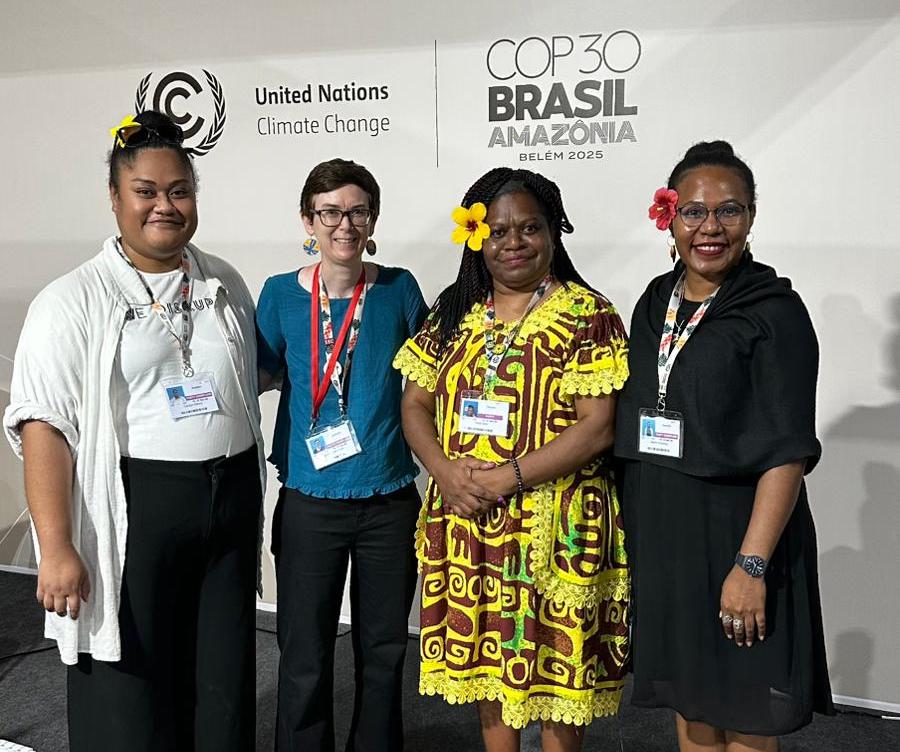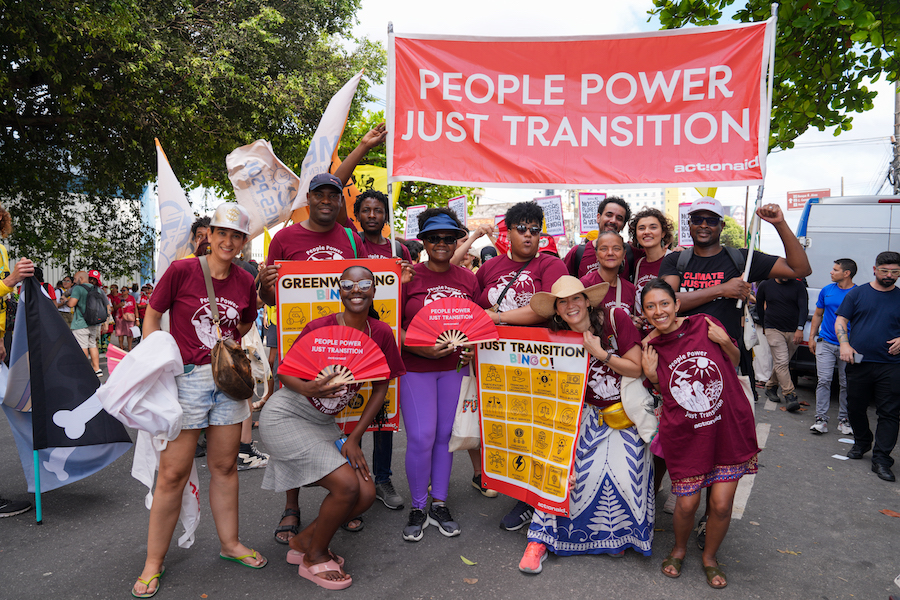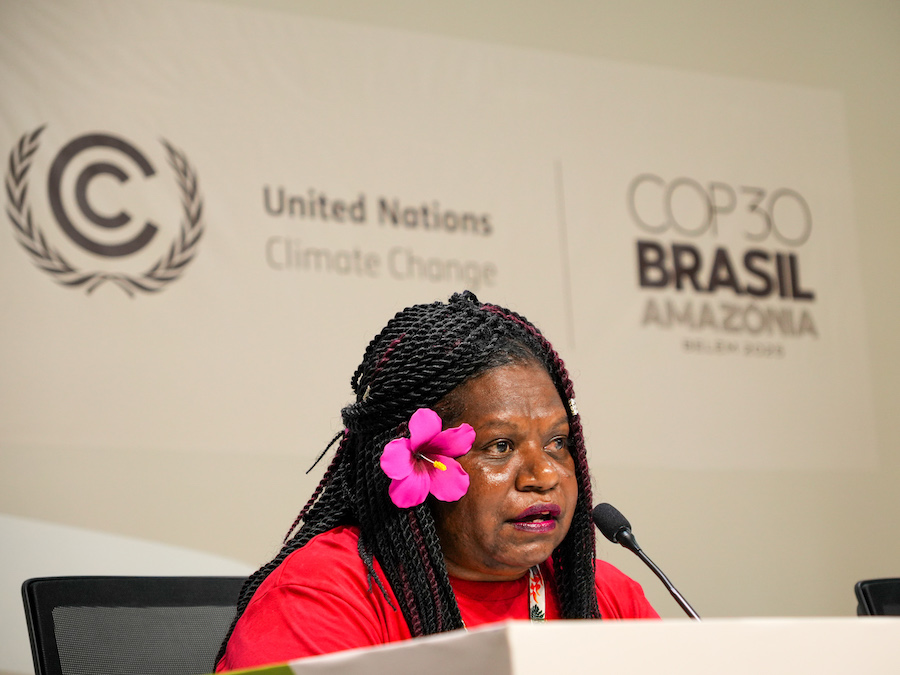After two long weeks the UN climate conference – COP30 – has come to an end. I travelled to Brazil with ActionAid colleagues and partners from across the Pacific, and beyond.
It was inspiring to meet other activists and climate leaders from around the globe who were pushing for climate solutions, especially in a year that is so crucial for lifting our ambition on climate action. Within just a few decades we could be facing up to four times as many heatwave days each year, four times the number of heat-related deaths, and bearing costs for climate disasters like fires and flooding that are seven times higher than now.
Here’s a run down of some of things we achieved, and some areas that we still need a lot more work on.

ActionAid went to COP30 with partners from the Pacific – (L-R) Carolyn Kitione from Shifting the Power Coalition, Sophie Hardefeldt from ActionAid Australia, Flora Vano from ActionAid Vanuatu and Naomi Woyengu from Hauskuk Initiative.
Moving away from fossil fuels
The science is clear that there is no place for fossil fuels in a 1.5°C future, and that’s why a global agreement to phase out fossil fuels is so critical. At COP30, Colombia led the way, calling on governments to address the root causes of the climate crisis – the burning of coal, oil and gas.
While it was disappointing that the final agreement failed to include a plan for transitioning away from fossil fuels, more than 80 countries supported the call for a fossil fuel phase out roadmap and the pressure on governments to act will only grow.
In a massive win – Australia signed onto its strongest ever statement on fossil fuels, the Belém Declaration on the Transition Away From Fossil Fuels. The statement acknowledges that our legally binding obligation to limit heating to 1.5°C means no new fossil fuel projects.
A Just Transition mechanism established
Global civil society came to COP30 calling for a Just Transition mechanism that would make sure that people’s priorities are front and centre of every climate response. This would ensure that those most affected by climate and economic shifts are not left behind, but are empowered and supported.
In a huge win for women, Indigenous people, workers and frontlines communities, the Just Transition mechanism was established. This will be critical in supporting countries to develop and implement transition plans in sectors such as energy, agriculture and minerals, to not only reduce emissions but also protect the rights of Indigenous peoples, communities and workers.

ActionAid staff and partners joined the Global Day of Action for Climate Justice at COP30 in Brazil.
A new Gender Action Plan
After two years of tough negotiations, and in the context of a push-back on the rights of women and LGBTQIA+ people, governments have approved a new Gender Action Plan. We know that climate disasters hit women first and worst – increasing women’s unpaid care work and driving gender-based violence. Women are also leading transformative climate action and paving a better path forward for their communities.
The Gender Action Plan includes specific references to health, violence against women, protects women climate activists, and recognises Indigenous people’s knowledge. It will increase women’s involvement in climate change decision-making and drive progress on women-led climate action that responds to women’s experiences and needs.
Climate finance for frontline communities
While COP30 has driven some important wins for people and the climate, progress was blocked by Australia and other rich, high polluting countries’ refusal to provide funding to countries and communities that are dealing with the worst impacts of the climate crisis.
Global South countries came to COP30 calling for a tripling of adaptation funding, which they need to build resilience in the face of escalating cyclones, floods and droughts. While this did make it into the final agreement, pushback from Australia and other rich countries meant we were left with a watered-down agreement and no clear action plan for how this funding for be delivered.
We need countries like Australia to keep their promises to women and their communities on the frontline – to provide the funding they owe so communities can respond to the worst impacts of the climate crisis and to transition away from fossil fuels. And it’s only fair that we make big polluters like oil and gas companies pay for the damage they’ve caused.

Flora Vano, ActionAid Vanuatu’s Country Manager, speaks at a press conference at COP30 in Brazil calling on big polluting countries to pay their fair share of climate finance to communities bearing the cost of the climate crisis.
What happens next?
While Australia was not successful in winning the bid to host COP31, Climate Minister, Chris Bowen will take on the role of President of the negotiations. This means he will set the agenda, and can ensure countries commit to bold action.
Australia has a huge responsibility to step up as a genuine climate leader, and build on the progress made at COP30 for a fossil fuel phase out, and on the delivery of the new US$300 million climate finance goal. ActionAid will continue to demand that Australia leads the path for climate action, and hold them accountable for the fossil free, feminist future we desperately need.
To be a true climate leader, Australia has to stop supporting fossil fuels. But even now, big Australian banks are giving money to coal, oil and gas companies that are expanding their projects. ANZ bank is the worst culprit – can you add your name to our letter to ANZ, asking them to stop fuelling the climate crisis?